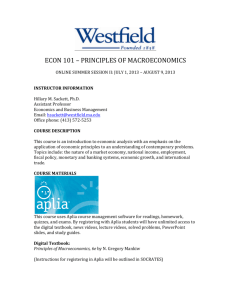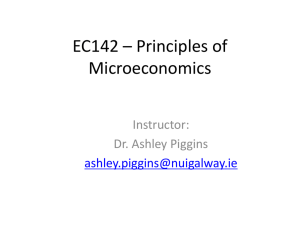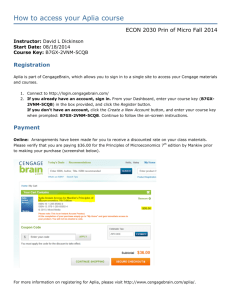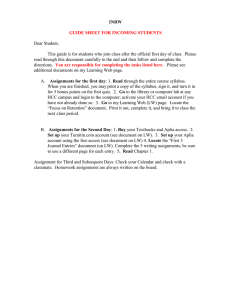Levy PSYCHOLOGY 2317 Syllabus Fall 2015.doc
advertisement
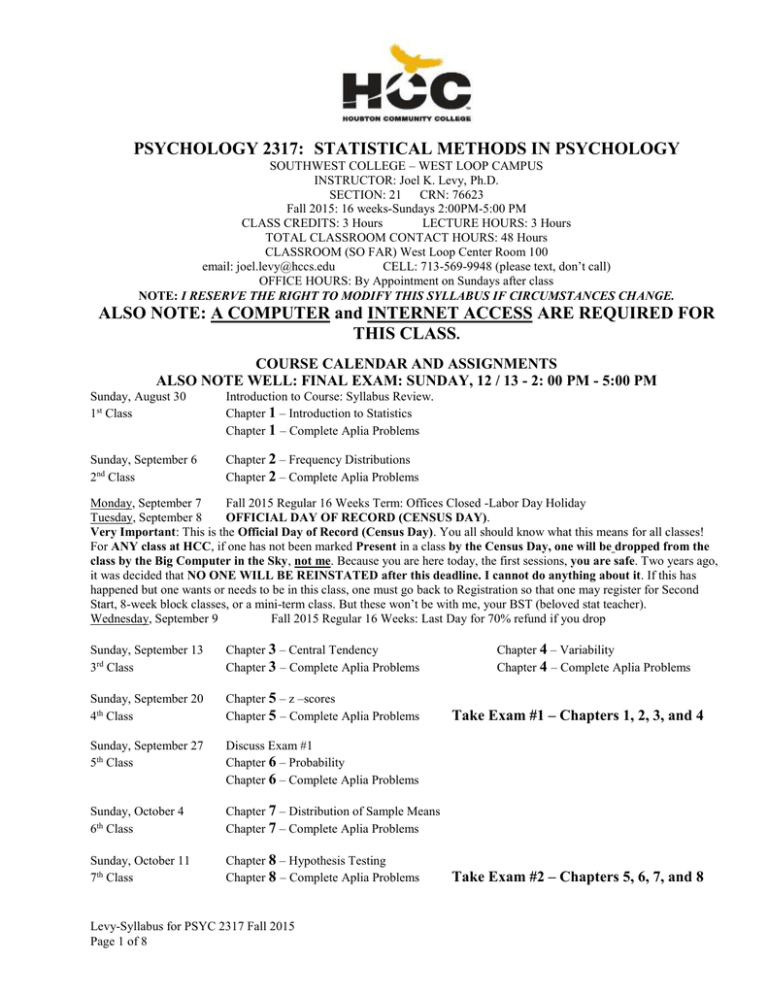
PSYCHOLOGY 2317: STATISTICAL METHODS IN PSYCHOLOGY SOUTHWEST COLLEGE – WEST LOOP CAMPUS INSTRUCTOR: Joel K. Levy, Ph.D. SECTION: 21 CRN: 76623 Fall 2015: 16 weeks-Sundays 2:00PM-5:00 PM CLASS CREDITS: 3 Hours LECTURE HOURS: 3 Hours TOTAL CLASSROOM CONTACT HOURS: 48 Hours CLASSROOM (SO FAR) West Loop Center Room 100 email: joel.levy@hccs.edu CELL: 713-569-9948 (please text, don’t call) OFFICE HOURS: By Appointment on Sundays after class NOTE: I RESERVE THE RIGHT TO MODIFY THIS SYLLABUS IF CIRCUMSTANCES CHANGE. ALSO NOTE: A COMPUTER and INTERNET ACCESS ARE REQUIRED FOR THIS CLASS. COURSE CALENDAR AND ASSIGNMENTS ALSO NOTE WELL: FINAL EXAM: SUNDAY, 12 / 13 - 2: 00 PM - 5:00 PM Sunday, August 30 1st Class Introduction to Course: Syllabus Review. Chapter 1 – Introduction to Statistics Chapter 1 – Complete Aplia Problems Sunday, September 6 2nd Class Chapter 2 – Frequency Distributions Chapter 2 – Complete Aplia Problems Monday, September 7 Fall 2015 Regular 16 Weeks Term: Offices Closed -Labor Day Holiday Tuesday, September 8 OFFICIAL DAY OF RECORD (CENSUS DAY). Very Important: This is the Official Day of Record (Census Day). You all should know what this means for all classes! For ANY class at HCC, if one has not been marked Present in a class by the Census Day, one will be dropped from the class by the Big Computer in the Sky, not me. Because you are here today, the first sessions, you are safe. Two years ago, it was decided that NO ONE WILL BE REINSTATED after this deadline. I cannot do anything about it. If this has happened but one wants or needs to be in this class, one must go back to Registration so that one may register for Second Start, 8-week block classes, or a mini-term class. But these won’t be with me, your BST (beloved stat teacher). Wednesday, September 9 Fall 2015 Regular 16 Weeks: Last Day for 70% refund if you drop Sunday, September 13 3rd Class Chapter 3 – Central Tendency Chapter 3 – Complete Aplia Problems Sunday, September 20 4th Class Chapter 5 – z –scores Chapter 5 – Complete Aplia Problems Sunday, September 27 5th Class Discuss Exam #1 Chapter 6 – Probability Chapter 6 – Complete Aplia Problems Sunday, October 4 6th Class Chapter 7 – Distribution of Sample Means Chapter 7 – Complete Aplia Problems Sunday, October 11 7th Class Chapter 8 – Hypothesis Testing Chapter 8 – Complete Aplia Problems Levy-Syllabus for PSYC 2317 Fall 2015 Page 1 of 8 Chapter 4 – Variability Chapter 4 – Complete Aplia Problems Take Exam #1 – Chapters 1, 2, 3, and 4 Take Exam #2 – Chapters 5, 6, 7, and 8 Thursday, October 15 Fall 2015 Regular 16 Weeks: Priority Deadline for Fall Completion of Degrees or Certificates Sunday, October 18 8th Class Discuss Exam #2 Chapter 9 – Introduction to the t-Statistic Chapter 9 – Complete Aplia Problems Sunday, October 25 9th Class Chapter 11 – Independent Samples t-Tests Chapter 11 – Complete Aplia Problems Friday, October 30 Fall 2015 Regular 16 Weeks: LAST DAY TO WITHDRAW WITH A W. AFTER THIS, YOU GET WHAT YOU GET. Sunday, November 1 10th Class DAYLIGHT SAVING TIME BEGAN THIS MORNING Discuss Exam #3 – Chapters 9, 10, and 11 Chapter 12 – One-Way Analysis of Variance Chapter 12 – Aplia Problems Sunday, November 8 11th Class Chapter 13 – Two-Way Analysis of Variance Chapter 13 – Aplia Problems Take Exam #3 – Chapters 9, 10, and 11 Take Exam #4 – Chapters 12 and 13 Sunday, November 15 12th Class Sunday, November 22 13th Class Chapter 10 –Related Samples t-Tests Chapter 10 – Complete Aplia Problems Discuss Exam #4 – Chapters12 and 13 Chapter 14 – Correlation and Regression Chapter 14 – Aplia Problems REMEMBER EGLS3 for 3 points on Final Grade EXTRA CREDIT! Wednesday Evening, November 25 Thursday, November 26 Sunday, November 29 No Classes on Thanksgiving Eve Thanksgiving Day No Class for Thanksgiving Break Sunday, December 6 14th Class Chapter 15 – Chi-Square and Nonparametric Tests Chapter 15 – Aplia Problems This was the Last Day of Instruction Monday, December 7 Fall 2015 Regular 16 Weeks: Final Examinations Begin All Aplia Homework should be finished. End of Aplia Homework being added to your grades. End of Extra Credit Quizzes being added to your grades. Sunday, December 13 15th Class Take non-comprehensive Final Exam, which is 2:00 PM-5:00 PM End of the Semester; by the Official College Calendar, Scheduled at the End of Today’s Class Period Monday, December 14 Friday, December 18 Test #5: Chapters 14 and 15 Poor Dr. Levy! Fall 2015 Regular 16 Weeks: Grades Due by 12:00 Noon Today Fall 2015 Regular 16 Weeks: Grades Available to Students by 12:00 Noon Today It is over! Happy New Year! Monday, December 21, 2015 – Sunday, January 3, 2016 Fall 2015 Regular 16 Weeks: Holiday Break Levy-Syllabus for PSYC 2317 Fall 2015 Page 2 of 8 To register for an account, go to https://login.cengagebrain.com You Need This Course Key To Register Online: EVEU-UJJV-2UWK You can begin working on assignments as soon as you register! In this course, you will purchase a textbook and your own access code to Cengage Aplia's website. You will have access to a digital version of your textbook on Aplia through the end of this course. HOW TO ACCESS YOUR APLIA COURSE Start Date: 08/30/2015 Registration: Connect to http://login.cengagebrain.com/course/EVEU-UJJV-2UWK. Follow the prompts to register for your Aplia course. Payment: After registering for your course, you will need to pay for access using one of the options below: Online: You can pay online using a credit or debit card, or PayPal. Bookstore: You may be able to purchase access to Aplia at your bookstore. Check with the bookstore to find out what they offer for your course. Free Trial: You can access Aplia until 11:59 PM on 09/19/2015 during your free trial. After the free trial ends you will be required to pay for access. Please note: At the end of the free trial period, your course access will be suspended until your payment has been made. All your scores and course activity will be saved and will be available to you after you pay for access. If you already registered an access code or bought Aplia online, the course key to register for this course is: EVEU-UJJV-2UWK System Check To check whether your computer meets the requirements for using Aplia, go to http://www.aplia.com/support/config.jsp Access is FREE for three weeks but THEN, payment must be made to continue. CLASS INFORMATION COURSE DESCRIPTION: An introduction to the use of scientific methods in psychology and to the statistical analysis of data. Attention is given to descriptive, correlation, and inferential statistical methodology. PREREQUISITE: Must be placed into college level reading (or take GUST 0342 as a co-requisite), and be placed into college level writing (or take ENGL 0310/0319 as a co-requisite), AND be placed into MATH 0312 (or higher). COURSE GOALS: To develop knowledge and skills in the use of proper statistical methodology (both descriptive and inferential statistics) in analyzing data collected by scientific methods in psychology. STUDENT LEARNING OUTCOMES: 1. Define and identify basic concepts in inferential and descriptive statistics. 2. Explain and apply the concepts and procedures of descriptive statistics. 3. Describe and utilize principles of probability and hypothesis testing. 4. Apply and interpret common inferential statistical tests and correlational methods. OBJECTIVES: Part I: The basic components of statistics. 1. To learn the basic terminology and logic of statistical analysis. 2. Master definitions and computations with the exception of the Power Curve and the Sample Size Determination and Requirements. Part II: Applications of inferential statistics to the scientific method 1. The t test will be introduced to replace the z test. 2. Compute one sample, independent sample and related sample t-tests. 3. Identify, apply, compute and interpret ANOVA, correlation and regression, and Chi Square REQUIRED TEXTBOOK: Gravetter, F.J. and Wallnau, L.B. (2011). Essentials of Statistics for the Behavioral Sciences, 8 th Ed., Wadsworth STUDY GUIDE: Gravetter, F.J. Study Guide for Essentials of Statistics for the Behavioral Sciences, Wadsworth. Levy-Syllabus for PSYC 2317 Fall 2015 Page 3 of 8 The accompanied textbook website offers some useful information concerning the statistical concepts. CLASSROOM ACTIVITY: Read the assigned chapters prior to class and complete the homework assignments. Come prepared to participate by asking questions, sharing examples, and giving your opinion. You may ask questions any time during class. We will review tests items after they are graded. INSTRUCTOR RESPONSIBILITIES: Prepare class lectures and exams; evaluate and review results; assign grades. STUDENT RESPONSIBILITIES: Attend classes in a timely manner and participate. Read and comprehend the textbook; request help in the event of questions or problems Complete required assignments and exams Maintain copies of paperwork, handouts, and assignments, including this syllabus HCC COLLEGE-WIDE POLICIES: HCC Policy Statements Access Student Services Policies on their Web site: http://central.hccs.edu/students/student-handbook/ HCC POLICY STATEMENT: STUDENTS WITH DISABILITIES: Any student with a documented disability (e.g. physical, learning, psychiatric, vision, hearing, etc.) who needs to arrange reasonable accommodations must contact the Disability Services Office at the respective college at the beginning of each semester. Faculty members are authorized to provide only the accommodations requested by the Disability Support Services Office. The ADA office for the Southwest College and Dr. Becky Hauri can be reached at 713-718-7910. Special accommodations can be provided to only those students who show proper documentation. HCC POLICY STATEMENT: ACADEMIC HONESTY: A student who is academically dishonest is, by definition, not showing that the coursework has been learned, and the student is claiming an advantage not available to other students. The instructor is responsible for measuring each student's individual achievements and also for ensuring that all students compete on a level playing field. Thus, in our system, the instructor has teaching, grading, and enforcement roles. You are expected to be familiar with the University's Policy on Academic Honesty, found in the catalog. What that means is: If you are charged with an offense, pleading ignorance of the rules will not help you. Students are responsible for conducting themselves with honor and integrity in fulfilling course requirements. Penalties and/or disciplinary proceedings may be initiated by College System officials against a student accused of scholastic dishonesty. “Scholastic dishonesty” includes, but is not limited to, cheating on a test, plagiarism, and collusion. Cheating on a test includes: Copying from another students’ test paper; Using materials not authorized by the person giving the test; includes cell phone Collaborating with another student during a test without authorization; Knowingly using, buying, selling, stealing, transporting, or soliciting in whole or in part the contents of a test that has not been administered; Bribing another person to obtain a test that is to be administered. Plagiarism means the appropriation of another’s work and the unacknowledged incorporation of that work in one’s own written work offered for credit. Collusion mean the unauthorized collaboration with another person in preparing written work offered for credit. Possible punishments for academic dishonesty may include a grade of 0 or F in the particular assignment, failure in the course, and/or recommendation for probation or dismissal from the College System. (See the Student Handbook) Not worth the cheating, is it, folks, when I can probably help you with what you need. HCC POLICY STATEMENTS: ATTENDANCE: Class Attendance - It is important that you come to class! Attending class regularly is the best way to succeed in this class. Research has shown that the single most important factor in student success is attendance. Simply put, going to class greatly increases your ability to succeed. You are expected to attend all lectures regularly. We only meet once a week, so each session is kind of critical. You are responsible for materials covered during your absences. Levy-Syllabus for PSYC 2317 Fall 2015 Page 4 of 8 If you are not attending class, you are not reinforcing the learning of the information. The information that is discussed in class is assumed to be important for your career. An HCC policy is that students may be dropped from a course after accumulating absences in excess of 16% hours of instruction. The seven or eight hours (0.16 X 48 hours) of class time would include any total classes missed or for excessive tardiness or leaving class early. This is like a little over two weeks of classes. Your instructor is NOT required to notify you prior to completing the drop. Class attendance is checked each session. Again, although it is your responsibility to drop a course for nonattendance or inability to attend, the instructor has the authority to drop you for excessive absences. However, I never have done this, because I maintain people “make their own beds to sleep in.” If you don’t come, you may fail on your own, and that is your responsibility. If you do not to attend a class, I would really appreciate it if you did notify me, either prior to, or, certainly, after the missed class. The reason for this is that the absence I input on the computer listing can be categorized as sickness, religious holidays, family emergencies, etc. If you let me know what happened, I will classify the absence thusly, and it can be excused. However, if this happens too many times, you may suddenly find that you have been “left in the dust,” and have “lost the class.” It is a good idea to find a friend or a “buddy” in class (“Cooperation leads to Graduation!”) who would be willing to share class notes or discussions if you miss a class. HCC COURSE WITHDRAWAL POLICY: If you feel that you cannot complete this course, you will need to withdraw from the course prior to the final date of withdrawal (this semester, March 24, before 4:30pm). Before you withdraw from your course; please take the time to meet with the instructor to discuss why you feel it is necessary to do so. The instructor may be able to provide you with suggestions that would enable you to complete the course. Your success is very important to me. Beginning in the fall of 2007, the Texas Legislature passed a law limiting first time entering freshmen to no more than SIX total course withdrawals throughout their educational career in obtaining a certificate and/or degree. To help students avoid having to drop/withdraw from any class, HCC has instituted an Early Alert process by which your professor may “alert” you and HCC counselors that you might fail a class because of excessive absences and/or poor academic performance. It is your responsibility to visit with your counselor to learn about what, if any, HCC interventions might be available to assist you – online tutoring, child care, financial aid, job placement, etc. – to stay in class and improve your academic performance. VERY IMPORTANT: Faculty and students are only allowed to withdraw students prior to the official last date for administrative/student withdrawal. Students are also responsible for withdrawing themselves prior to the official date by dropping online, completing a withdrawal form on campus, sending a postmarked letter, or faxing a letter of withdrawal to the Registrar at 713-718-2111. A grade of FX (stopped attending and failed) can be assigned along with notation of the last class date attended for students who do not withdraw, but stop attending or abandoned the class. Students may not be withdrawn for poor classroom performance or for inappropriate behavior -only for excessive absences according to stated policy. However, inappropriate behavior will get you ejected from the class session. VERY IMPORTANT: If you plan on withdrawing from your class, you MUST COMPLETE THE PROCESS PRIOR to the withdrawal deadline, March 24, to receive a “W” and not an “F” on your transcript. You can drop a course by returning to the same online enrollment page that you used to register originally for classes. From the drop-down menu, select enrollment – drop instead of enrollment. If you do not withdraw before the deadline, you will receive the grade that you are making in the class as your final grade (but that means that if you miss tests and the Final, those will be averaged in as Zeroes! Don’t do this to yourself.). Levy-Syllabus for PSYC 2317 Fall 2015 Page 5 of 8 Remember to allow a 24-hour response time when communicating via email and/or telephone with a professor and/or counselor. Do not submit a request to discuss withdrawal options less than three days before the deadline. Repeat Course Fee: The State of Texas “encourages” students to complete college without having to repeat failed classes. To “encourage” student success, students who repeat the same course more than twice, are required to pay extra tuition. The purpose of this extra tuition fee is to lean on students to pass their courses and to graduate. If you are considering course withdrawal because you are not earning passing grades, confer with your instructor/counselor as early as possible about your study habits, reading and writing homework, test taking skills, attendance, course participation, and opportunities for tutoring, extra credit, or other assistance that might be available. HCC will charge a higher tuition rate to students registering the third or subsequent time for a class. CLASSROOM BEHAVIOR: As your instructor and as a student in this class, it is our shared responsibility to develop and maintain a positive learning environment for everyone. Your instructor takes this responsibility very seriously and will inform members of the class if their behavior makes it difficult for him/her to carry out this task. As a fellow learner, you are asked to respect the learning needs of your classmates and assist your instructor achieve this critical goal. HCC POLICY ON USE OF CAMERA AND/OR RECORDING DEVICES: As a student active in the learning community of this course, it is your responsibility to be respectful of the learning atmosphere in your classroom. To show respect of your fellow students and instructor, you will turn off your phone and other electronic devices, and will not use these devices in the classroom unless you receive permission from the instructor. On test days, before the tests are handed out, you will be requested to put your phone on the table in the front of the room and retrieve them after the test. Use of recording devices, including camera phones and tape recorders, is prohibited in classrooms, laboratories, faculty offices, and other locations where instruction, tutoring, or testing occurs, due to copyright laws. Students with disabilities who need to use a recording device as a reasonable accommodation should contact the Office for Students with Disabilities for information regarding accommodations Use of Computers in Class: If you use a computer to take notes, this instructor does not mind that, but wants to assure you that surfing the net, or emailing during class is not permitted, and may result in your losing the privilege to use the computer for legitimate note-taking for the rest of the semester! Don’t try it. TESTING: Testing Process: The tests will consist of multiple-choice items that will be selected from the information in the text. You will need to bring your own Scantrons® purchase and and several good, sharpened No. 2 pencils, or a mechanical pencil with HB leads (or softer) to class for every exam. Bring a good eraser to the exam and erase changes completely. The white rectangular ones work the best. No grades will be changed due to poor erasures after your exam is graded and returned. Please be careful. Plan to take all examinations. THERE ARE NO MAKE-UP EXAMS PROVIDED, with the exception of very drastic circumstances or emergencies of which I am the judge. ONE REALLY LOW OR MISSED EXAM SCORE WILL BE DROPPED FROM YOUR AVERAGE; e.g. SCORES OF 4 OUT OF 5 TESTS. USE OF NOTES ON TESTS: Examinations will be OPEN-NOTE but you must refer to YOUR OWN NOTES during the exam. You may not use the interior of the textbook, the actual chapter content, but you may refer to the statistical tables in the rear of the book, the formulas listed on the inside of the book cover and any personal notes/homework solutions YOU prepare. Photocopies of ANY textbook material other than tables MAY NOT BE USED DURING ANY EXAMINATION. Only notes that you type or write prior to the tests may be used during examinations. Nothing else printed or photocopied may be used, except for what I hand out to you. Levy-Syllabus for PSYC 2317 Fall 2015 Page 6 of 8 ON A TEST DAY: PLEASE TAKE CARE OF ALL PERSONAL NEEDS prior to the beginning of an examination. EVALUATION AND GRADES: Your final grade will be calculated according to the following core competency formula: A) The best four of five exams will be averaged and weighted 90%. B) Homework assignments will be weighted 10%. Final Average Scores will earn the following grades A = 100- 90 4 points per semester hour B = 89 - 80: 3 points per semester hour C = 79 - 70: 2 points per semester hour D = 69 - 60: 1 point per semester hour F = 59 and below 0 points per semester hour AUD (Audit) 0 points per semester hour IP (In Progress) 0 points per semester hour W (Withdrawn) 0 points per semester hour I (Incomplete) 0 points per semester hour FX (Failed and Stopped Coming to Class): 0 points per semester hour IP (In Progress) is given only in certain developmental courses. The student must re-enroll to receive credit. COM (Completed) is given in non-credit and continuing education courses. To compute grade point average (GPA), divide the total grade points by the total number of semester hours attempted. The grades "IP," "COM" and "I" do not affect GPA. I will keep a running spreadsheet of grade averages across the semester, updated after each test, and will endeavor to make copies of it to pass out to you after every exam so that you can see how you are standing. Plan to take all exams. There can be no make-up exams provided, with the exception of very drastic circumstances or emergencies, which I will rule on. This semester moves too fast to try to catch up with a missed exam. Remember, one missed exam score will be dropped. Please make this the lowest of the scores of the exams you took, not one you missed. GRADED HOMEWORK: This is why you paid the big bucks to buy the code for the online Cengage Aplia Access. The sign-in with the code gets you to the online homework. There is a set of homework of a varied number of questions for each textbook chapter. You answer these online, so you have to buy the code for the login. You get THREE (3) chances to get the highest grade you can on each homework assignment. I am going to keep the access open for all chapters (I control this) until the last week of classes. Then, I have to close them in order to get the scores and average these with the test scores. I have to have a cut-off date so that I can get your grades in on time, WHICH IS THE NOON OF THE DAY AFTER THE FINAL! As above, the graded Aplia homework score average counts for 10% of your grade, and the tests and extra credit quizzes count 90! Please do these. You paid for it. If you get a 90-test-score average, and don’t’ do any of the graded homework, then 90% of your grade times the 90 test score average is going to come out to a final grade average of 81! This is a B! Did you really want to cheat yourself out of an A by not doing any of the graded homework? If you have trouble setting up an account for yourself after you have paid for this, I will help you. EXTRA CREDITS: CHAPTER PRACTICE QUIZZES: You may earn ONE BONUS PERCENTAGE POINT PER CHAPTER added to EACH TEST SCORE PERCENTAGE by completing and submitting the practice quizzes provided on the student companion website to the 7th Edition textbook. WOW, THAT’S A POSSIBLE 15 POINTS! I will show the class how to access these quizzes. Anyone can, through the HCC Learning Web. You don’t need an access code for these. EGLS3 (EVALUATION FOR GREATER LEARNING STUDENT SURVEY SYSTEM): At Houston Community College, professors believe that thoughtful student feedback is necessary to improve teaching and learning. During a designated time near the end of the term, you will be asked to answer a short online survey of researchbased questions related to instruction. The anonymous results of the survey will be made available to your professors and department chairs for continual improvement of instruction. Go to www.hccs.edu/egls3 for more information. Levy-Syllabus for PSYC 2317 Fall 2015 Page 7 of 8 At the end of the semester, this instructor will award 3 extra percentage points to your FINAL GRADE percentage to students who complete the EGLS3 survey about this class, and then print out and bring me (or email) the confirmation that you did it. Note well: The EGLS3 survey period will be over before the course is over, so you will have time to show me your printout before I formulate the final grades. Wow! Another 3 free points. GOOD LUCK ON THIS SEMESTER! Levy-Syllabus for PSYC 2317 Fall 2015 Page 8 of 8

